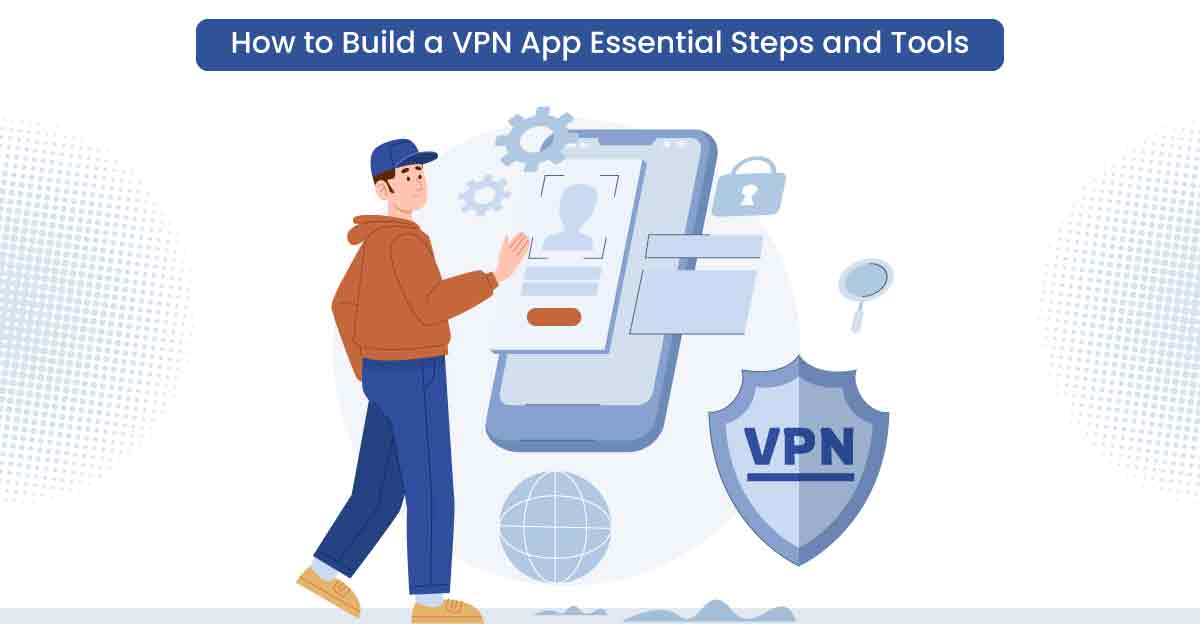How to Build a VPN App Essential Steps and Tools
Security and privacy are now top priorities in the digital era. Virtual Private Networks (VPNs) offer a reliable solution by encrypting internet traffic and masking users' IP addresses. This article will guide you through the essential steps and tools to Build a VPN App, empowering you to protect your online privacy and security.

Key Considerations Before Starting
● Target Audience: Identify your ideal users. Understanding their needs and preferences will help you tailor your VPN app accordingly.
● Features: Determine the core features you want to include in your app. Prioritize based on your target audience's requirements and your budget constraints.
● Platform: Consider your target audience's device preferences when making this decision.
● Budget: A reasonable budget should be set for your app development project. This will assist you in making wise choices all along the way.
Essential Steps to Build a VPN App
For considerations regarding the VPN build, it seems best to consider a reputed app development company first there are many mobile application development in Jaipur
1. Choose a Development Platform:
● Native Development: For iOS, use Swift; for Android, use Kotlin. This offers optimal performance and control but requires separate development for each platform.
● Cross-Platforms Development: Utilize frameworks like React Native or Flutter to create apps for both iOS and Android with a single codebase. This can save time and resources.
2. Select a VPN Protocol:
● OpenVPN: A widely used and secure protocol known for its flexibility and reliability and one of the crucial steps to build VPN application.
● WireGuard: An updated protocol that is commended for its speed, security, and ease of use.
● IKEv2: Another popular protocol offering good performance and security.
3. Integrate a VPN Library or SDK:
● Open-Source Libraries: Use libraries like OpenVPN for Android or NetworkExtension for iOS.
● Third-Party SDKs: Consider using pre-built SDKs from providers like Cloudflare Tunnel or NordVPN.
4. Implement User Interface and Experience:
● Design an intuitive and user-friendly interface that allows users to easily connect to different servers and manage their VPN settings.
● Provide clear information about the app's features and benefits.
5. Configure Server Infrastructure:
● Set up VPN servers in various locations to offer users different IP addresses and improve performance.
● Consider using cloud-based infrastructure for scalability and cost-effectiveness.
6. Implement Security Measures:
● Encryption: Ensure strong encryption algorithms are used to protect user data.
● Authentication: Put strong authentication procedures in place to stop unwanted access.
● Privacy Policies: Clearly outline your app's privacy practices and data handling policies.
7. Test Thoroughly:
● To make sure your software is functional and compatible, test it across a range of hardware and operating systems.
● To find and fix possible vulnerabilities, do security audits.
8. Submit to App Stores:
● Follow the guidelines and requirements of the Apple App Store and Google Play Store to submit your app for review and publication.

Key Tools for VPN App Development
For such tools and devices consider mobile app development in Jaipur where you can find your answers.
1. Development Environments:
● Xcode: For iOS development.
● Android Studio: For Android development.
● Visual Studio Code: A popular code editor that can be used for cross-platform development.
2. Version Control Systems:
● Git: A widely used version control system for managing code changes and collaborating with other developers.
3. Testing Tool
● Appium: A popular open-source test automation framework for mobile apps.
● Espresso: A testing framework for Android apps.
● XCTest: A testing framework for iOS apps.
4. VPN Libraries and SDKs:
● OpenVPN: A popular open-source VPN library.
● NetworkExtension: A framework for iOS VPN development.
● Third-party SDKs: Consider using pre-built SDKs from VPN providers.
5. Cloud Platforms:
● Amazon Web Services (AWS): A popular cloud platform for hosting VPN servers.
● Google Cloud Platform (GCP): Another popular cloud platform option.
Monetization Strategies for Your VPN App
1. Freemium Model: Offer a basic version of your VPN app development for free and charge for premium features or unlimited data.
2. Subscription Model: Provide a subscription-based service with access to exclusive features or servers.
3. In-App Purchases: Allow users to purchase additional features or data packs within the app.
4. Partnerships: Partner with other companies to provide promotions or packaged services.
Marketing and Promotion of Your VPN App
1. App Store Optimization (ASO): To increase your app's exposure in app stores, use eye-catching images, intriguing descriptions, and pertinent keywords.
2. Social Media Marketing: Use social media sites like Facebook, Twitter, and Instagram to advertise your app.
3. Content Marketing: Create blog posts, articles, and tutorials to educate users about VPNs and the benefits of your app.
4. Influencer Marketing: Partner with influencers in the tech or privacy space to promote your app.
5. Public Relations: Reach out to media outlets to generate press coverage for your app.
Features for a VPN App
To enhance your VPN app's appeal and functionality, consider incorporating these additional features:
1. Split Tunneling: Allow users to select specific apps or websites to bypass the VPN tunnel, ensuring faster speeds for certain activities.
2. Kill Switch: Automatically disconnect the internet connection if the VPN connection drops, preventing accidental data leaks.
3. Ad Blocking: Integrate ad-blocking capabilities to enhance user privacy and improve browsing speed.
4. DNS Leak Protection: Prevent DNS leaks that could reveal your real IP address.
5. Server Selection: Offer a variety of server locations to cater to different user needs and optimize performance.
6. Speed Test: Provide an integrated speed test to help users choose the fastest server for their location.
7. Multi-Platform Support: Develop your app for multiple devices, such as smartphones, tablets, and computers, to reach a wider audience.
8. Customer Support: Offer reliable customer support channels, such as email, live chat, or a ticketing system, to address user inquiries and issues.
9. Leverage Community Support: Join online forums and communities dedicated to VPN development to connect with other developers, share knowledge, and get assistance.
10. Consider Open-Source VPN Projects: Explore existing open-source VPN projects to learn from their code, architecture, and best practices.
Security Considerations for VPN App Development
When building a VPN app, it's crucial to prioritize security to protect user data and maintain trust. Here are some key security considerations:
1. Encryption: Use strong encryption algorithms to protect user data, such as AES-256.
2. Authentication: Implement robust authentication mechanisms, such as two-factor authentication (2FA), to prevent unauthorized access.
3. Privacy Policies: Clearly outline your app's privacy practices and data handling policies.
4. Regular Updates: Keep your app updated with the latest security patches and fixes.
5. Third-Party Audits: Conduct regular security audits to identify and address potential vulnerabilities.
Case Studies: Successful VPN Apps
To gain inspiration and learn from the experiences of others, let's examine some successful VPN apps:
1. NordVPN: NordVPN is a popular VPN service with a user-friendly app that offers a wide range of features, including split tunneling, ad-blocking, and a large network of servers.
2. ExpressVPN: ExpressVPN is known for its fast speeds and strong security features. The application provides users with an easy-to-use interface that facilitates connecting to VPN servers.
3. Surfshark: Surfshark is a budget-friendly VPN service that offers unlimited connections and a wide range of features, including ad-blocking and malware protection.
Conclusion
Building a VPN app can be a rewarding endeavor, providing you with the opportunity to protect your online privacy and security. By following the steps outlined in this article and incorporating the essential features and security measures, you can create a successful VPN app that meets the needs of your target audience.
Remember to continuously monitor your app's performance, gather feedback from your users, and make necessary updates to ensure its long-term success. With the right approach, your VPN app can become a valuable tool for protecting user privacy and security in the digital age.
FAQs Build a VPN App Essential Steps and Tools
Answer: The costs can vary depending on factors such as the development platform, features, server infrastructure, and marketing expenses. However, by using open-source tools and leveraging cloud-based services, you can significantly reduce costs.
Answer: The development time can vary depending on the complexity of your app and the chosen development method. However, with careful planning and efficient development practices, you can create a basic VPN app within a few months.
Answer:Some challenges include maintaining server infrastructure, ensuring app security, complying with regulations, and staying competitive in a crowded market. However, by addressing these challenges proactively, you can build a successful VPN app.
Answer: Popular monetization strategies include freemium models, subscription models, in-app purchases, and partnerships with other businesses.
Answer:VPN apps are subject to various legal and regulatory requirements, including data privacy laws, export controls, and licensing regulations. It's essential to research and comply with all applicable laws in your jurisdiction.
